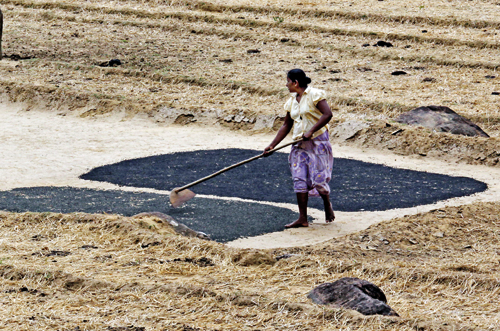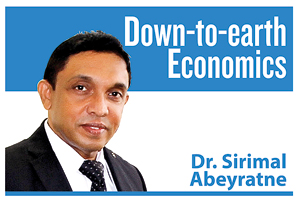Road to economic independence
View(s):
Has Sri Lanka got economic freedom?
Political independence is the outcome of political freedom. We just celebrated the 74th anniversary of gaining political independence in 1948 from the British colonial rulers. If a nation has political independence, it has its own government and it is not ruled by any other country or nation.
In the same way, “economic independence” is the outcome of economic freedom! Economic independence is the ability of a nation to stand on its own; it’s part of a nation’s dignity. In other words, it is the economic capacity and economic progress of a nation. It has to be achieved as an outcome of economic freedom. We all cherish the concept of “freedom” in general; but do we cherish economic freedom as much as we cherish political freedom? If there is a clear distinction in the way we treat between the two concepts – in fact, I think we do – then we must also accept the outcome: We have gained political independence, but not economic independence! Let us focus on this issue today.
Among the top
Many would acknowledge the fact that Sri Lanka was much more prosperous than most of the other countries in Asia at the time of gaining political independence even though they didn’t know why they would say that. It’s the economy that we inherited from our colonial rulers which included a high human development standard, well-developed infrastructure, a well-functioning judiciary and a democratic political system of the Westminster type.
Due to prosperous primary export crops – tea, rubber and coconut – during colonial times, one of the British economists, Joan Robinson wrote in 1959, Ceylon’s “national income per head…is, up till now, one of the highest in Asia”. Along with its high income, the country’s achievements in health and education were exceptional among the developing countries and were comparable with those of developed countries. The main development challenge at the time was not that of raising the people’s living standard, but of maintaining it in the face of a rapidly growing population.
 Sir John Hicks, another British economist who visited Colombo as an economic adviser to the Sri Lankan government in the 1950s, wrote: “If it were not for the population pressure, the urge for development [in Sri Lanka] might not be so very great; for there is not at the moment a crushing problem of poverty and malnutrition such as there is in neighbouring countries. The country also inherited a highly competitive pluralistic political system, which was known to be an outstanding model of Third World democracy, characterised by regular general elections, based on universal franchise, to select the government. In referring to the all favourable initial conditions as well as the peaceful transfer of political freedom from the colonial rulers, Donald Snodgrass, who wrote the book “Ceylon; an export economy in transition” questioned: “What more could a newly independent nation want?”
Sir John Hicks, another British economist who visited Colombo as an economic adviser to the Sri Lankan government in the 1950s, wrote: “If it were not for the population pressure, the urge for development [in Sri Lanka] might not be so very great; for there is not at the moment a crushing problem of poverty and malnutrition such as there is in neighbouring countries. The country also inherited a highly competitive pluralistic political system, which was known to be an outstanding model of Third World democracy, characterised by regular general elections, based on universal franchise, to select the government. In referring to the all favourable initial conditions as well as the peaceful transfer of political freedom from the colonial rulers, Donald Snodgrass, who wrote the book “Ceylon; an export economy in transition” questioned: “What more could a newly independent nation want?”
Even the Singaporean Prime Minister Lee Kuan Yew after his first visit to Sri Lanka in 1956 wrote in his Singapore Story: “l walked around the city of Colombo, impressed by the public buildings, many with stone facing undamaged by war…. Ceylon had more resources and better infrastructure than Singapore”.
The big question
The big question that we as a nation need to ponder at our annual celebrations of the Independence Day every year is, “why did Sri Lanka slip down in its economic status that it inherited from Britain”. And it happened in the hands of our own political leaders! In 1999, Donald Snodgrass aptly put it: “Whatever a reasonable assessment at the time [of independence] may have been, succeeding decades have revealed Sri Lanka as an undistinguished economic performer among the developing nations of Asia and the world”.
While it happened to Sri Lanka over the past 74 years, many countries in Asia which were behind Sri Lanka continued to perform surpassing us and achieving better standards in education, health and human development. It still continues, as some of the developing countries in Asia which are still poorer than Sri Lanka have been performing faster than Sri Lanka.
If economic independence is to be achieved through the nation’s performance and wealth creation, the question is not allowing it and how is it not allowed. This is where the concept of “economic freedom” is important, because it is the economic freedom that allows and facilitates the nation’s economic performance and wealth creation.
Economic freedom
Economic freedom is the “freedom to make choices that makes the life better”. Do we all have that freedom? If it is the case, then we all are expected to enjoy a greater freedom of right to decide in meeting our needs and wants as well as in reaching our future goals and aspirations. If we had that freedom of choice, Sri Lanka would have been a different country today.
Let me elaborate a couple of key points here: If somebody else decides it for you, then there is no economic freedom. Equally important is that, if somebody decides it for himself or herself by infringing your freedom, then you are losing your economic freedom too. In either case, your economic freedom can be trespassed by someone else limiting your economic progress as an individual or a nation.
The question is now, “who is this someone else?” It could be a person such as a politician or a bureaucrat; an organisation such as a trade union or a religious institution; and most importantly, it could be a government which adopt policies and regulations and establish anti-progressive institutions and systems.
The individual is bound to lose the freedom to choose when someone else has the right either (a) to decide it for himself or herself infringing the boundary lines of freedom or (b) to take away the choices available to people by using policies, regulations and institutions (such as bureaucracy or judiciary). This implies that “one’s freedom has a limit, while the boundary of that limit is the instance where one’s freedom infringes the freedom of others”. Apart from the government, thus, individuals, groups, firms, organisations and any other
entity may be found in infringing someone’s economic freedom trespassing its boundaries.
Thus, we need to be clear about one thing: Economic freedom is not the absence of policies, rules and regulations, but rather the opposite – establishing the policies, rules and regulations to protect everyone’s freedom to choose”. In other words, it is all about the “quality of economic policies, rules, regulations and, institutions”.
Sri Lanka’s standards
According to the report on Economic Freedom of the World, Sri Lanka with the ranking of 94th position among 165 countries in 2019 is not even among the first 50 per cent of the countries. The five areas where a nation’s freedom to choose is possibly infringed by the governments are (a) the government budgetary management, (b) rule of law and property rights, (c) money and inflation, (d) international trade and, (e) regulation of credit, labour and business. In fact, the “road to economic independence” lies through these five areas.
Various policies, regulations and institutions falling under these five major areas are open to infringe economic freedom of our nation, preventing the nation to achieve economic independence. By 2019, Sri Lanka’s status regarding the quality of these policies, regulations, and institutions has further deteriorated from the previous year – 2018. What has happened to our nation’s economic freedom in the midst of COVID-19 pandemic, particularly in 2020 and 2021, is yet to be seen from international data reports.
The country’s poorest record of performance is clear in three areas – the rule of law, international trade and, regulatory mechanism. What is more disappointing is that, the rule of law is an area where Sri Lanka has never made any progress through substantial reforms, while international trade is an area where the country has deteriorated after initial policy reforms in 1977.
(The writer is a Professor of Economics at the University of Colombo and can be reached
at sirimal@econ.cmb.ac.lk and follow on Twitter @SirimalAshoka).
Hitad.lk has you covered with quality used or brand new cars for sale that are budget friendly yet reliable! Now is the time to sell your old ride for something more attractive to today's modern automotive market demands. Browse through our selection of affordable options now on Hitad.lk before deciding on what will work best for you!


